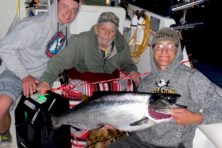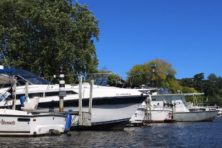Anglers, DNR Work to Net Best Lake Michigan Fishing Strategy
- Share
- Tweet
- Pin
- Share
Planning the next three-year stocking strategy for Lake Michigan salmon and trout is underway. DNR staff are wading through data on alewife abundance, average salmon size, catch statistics and other critical fisheries information, and soon they will be seeking public input.
The last plan was developed in 2017 after more than two years of input from nearly 500 anglers, business owners and other interested parties. Stocking was reduced to better balance the predator-to-prey ratio, and more large fingerlings were used to aid survival. The DNR also partnered with fishing clubs to place hatchery salmon in net pens for days to allow them to acclimate and to protect them from cormorants, gulls and mergansers before being released. That often meant a tow to deeper water and a release at night, when diving birds weren’t active.
The first step to re-engaging stakeholders for 2020 and beyond begins April 15, 6-9 pm, when DNR and UW Sea Grant will team up to host a semiannual Lake Michigan Fisheries Forum meeting at Lakeshore Technical College in Cleveland. The public is invited. DNR staff will take comments, get input on the information to be presented and share a timeline for future public meetings. Attendees will also discuss citizen-science projects, commercial fishing, guide reporting on Green Bay and other Great Lakes fishery news.
Spring hearings
March Madness wraps up in April – on Monday, April 8, at 8 pm, when the men’s NCAA basketball championship tips off in Minneapolis.
Closer to home and an hour earlier, the spring fish and wildlife rules hearings and Conservation Congress county meetings will be held at Kewaunee and Sturgeon Bay High Schools.
New this year, online voting will begin at 7 pm on April 8 and remain open for 72 hours at dnr.wi.gov/About/WCC/springhearing.html.
In addition to questions of statewide interest, there are others that could eventually affect local anglers.
One asks whether the panfish daily bag limit on Clark Lake should be lowered to 10 (down from 25) in an effort to increase the abundance of larger panfish. Another seeks input on whether the Mink River should observe a total fishery closure in the spring, through June 15, to protect spawning smallmouth bass from repeated catch-and-release stress.
Other questions ask whether you’d like to see deer-tagging requirements restored, the youth hunting age limit increased to 10, baiting and feeding eliminated statewide, upland game-bird hunters required to wear blaze clothing, the bag limit on long-tailed ducks reduced from six to three, and lead ammunition and fishing gear banned.
Deer survey
Door and Kewaunee County deer hunters and others interested in weighing in on whitetails may comment on the 2019 preliminary recommendations for deer-hunting seasons and antlerless tags.
Both the Door and Kewaunee County Deer Advisory Councils (CDAC) are recommending an antlerless gun deer hunt over the Christmas break. The Door CDAC wants to give five free tags with each license purchased – the same as last year – and Kewaunee four (up from three). Even though most hunters use zero to two antlerless tags, giving free tags to those with access to overpopulated herds is an incentive to shoot more deer and sends a message to all hunters that there are too many deer on the landscape.
Meanwhile, after trying an extended archery and crossbow season for the first time last season, the Door CDAC is not recommending it for 2019. A motion for an extended bow and crossbow hunt in Kewaunee County led to a 4-4 vote, with the chairperson breaking the tie, voting not to recommend an extension.
Anyone may comment online through April 10 at dnr.wi.gov/topic/hunt/cdac.html or attend the final recommendation meetings on April 16 at the Door County Courthouse or April 17 at the Muskrat City Sportsman’s Club. Both begin at 7 pm.
Take a hike
A walk on the wild side can be good for the mind, body and spirit; help lower blood pressure and heart rate; and reduce incidences of cardiovascular and respiratory diseases.
Time spent in nature can also reduce depression, anxiety and stress. Olivia Witthun, DNR urban forestry coordinator, said nearly 16 million adults in the U.S. experience major depression each year; some 40 million are affected by anxiety disorders; and 80 percent are impacted by stress. Researchers have repeatedly found evidence for improved mental health with exposure to nature. Trees and green environments support relaxation and reduce stress, which improve overall mental health, mood and life functioning.
Water Summit set
Registration is open for the 2019 Water Summit, to be held June 4-6 at the Landmark Resort in Egg Harbor. The summit will feature keynote talks from underwater explorer Jill Heinerth and author Dan Egan and presentations on fisheries, aquatic invasive species, sustainability, agricultural impacts, water policy and more.
The cost is $35 per person. Optional field trips are $20 each, and lodging is extra. For more details, visit CelebrateWaterDoorCounty.org.



